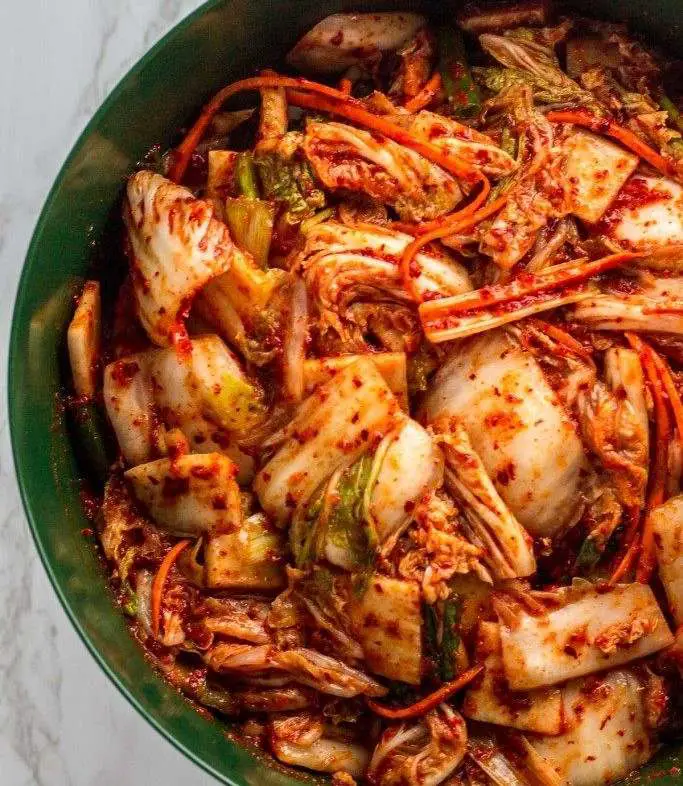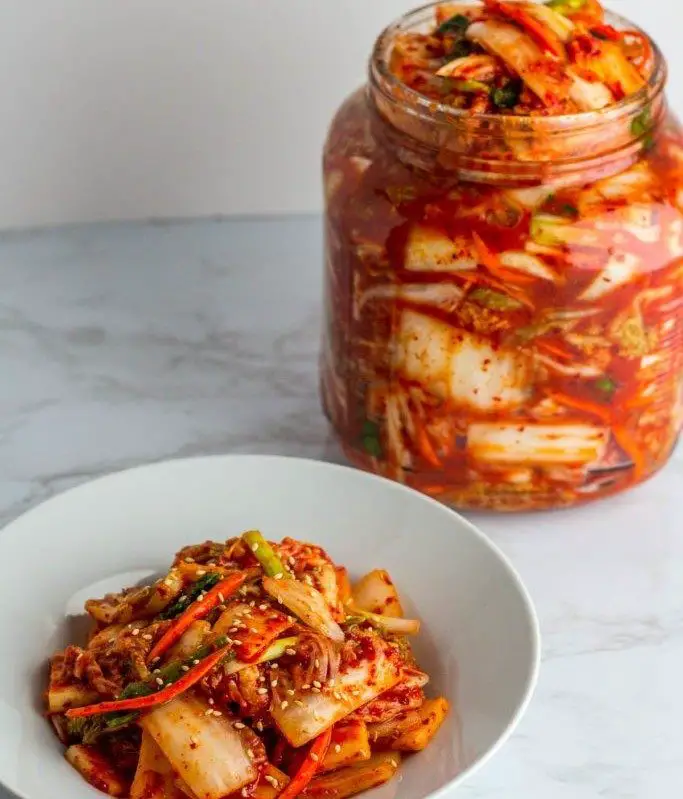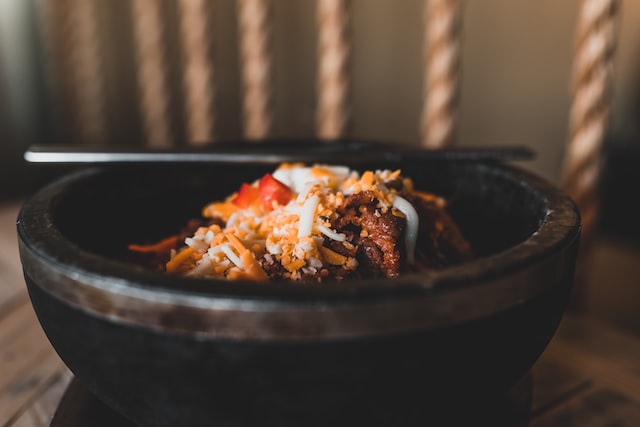Kimchi, the South Korean national dish, is a spicy pickled vegetable dish.
Traditionally, kimchi is prepared by fermenting cabbage, radishes, or scallions in a brine that includes chili peppers, ginger, garlic, and fish sauce.
South Korea’s kimchi has a long history extending back more than 2,000 years.
Traditionally, kimchi is fermented in cool earthen pits to slow the rate at which germs can multiply. Kimchi, when properly prepared, can help preserve veggies throughout the year.
It is a crispy, delicious meal with significant health advantages.
Contents
Nutritional Information
Although kimchi is not always made from radish and cabbage, these are the two most common basic ingredients.
A serving of 60 grams of cabbage kimchi includes 10 calories, less than half a gram of fat, and 1 gram of protein.

In addition to being low in fat and calories, cabbage is also rich in calcium, iron, and vitamin A. Radish is high in nutritional fiber, and the red chili peppers used to flavor kimchi include both vitamins A and C.
The fermentation process and the presence of active lactic acid bacteria give kimchi its signature sour flavor.
According to a renowned health clinic, consuming probiotic foods such as kimchi may help treat a number of digestive ailments and prevent the common cold and influenza.
Aids In Weight Loss?
A study published in a nutritional journal in 2011 examined the benefits of incorporating kimchi into the diets of 22 obese or overweight adults.
Subjects were randomly allocated to consume fermented or fresh kimchi during two four-week periods separated by a two-week rest.
Both groups demonstrated changes in body weight and composition, with the fermented kimchi group exhibiting decreased waist-to-hip ratio, fasting blood glucose levels, and larger improvements in blood pressure and total cholesterol levels than the fresh kimchi group.
Contains Probiotics
The Lacto-fermentation process that kimchi undergoes distinguishes it from other foods. Not only do fermented foods have a longer shelf life, but their flavor and scent are also enhanced.
Fermentation happens when organisms such as mold, yeast, or bacteria transform starch or sugar into alcohol or acid.
Lacto-fermentation utilizes the bacterium Lactobacillus to convert carbohydrates into lactic acid, which imparts kimchi with its signature sourness.
This bacterium may provide various benefits when taken as a supplement, including the treatment of illnesses such as hay fever and certain types of diarrhea.

Additionally, fermentation provides an environment in which other beneficial bacteria can live and grow. These include probiotics, which are live bacteria that, when ingested in large quantities, provide health advantages.
In reality, they are associated with the prevention and treatment of a number of diseases, including:
- certain forms of cancer
- the typical cold
- constipation
- digestive system health
- cardiac health
- mental wellbeing
- skin disorders
Keep in mind that many of these studies pertain to high-dose probiotic supplements, not the quantities typically seen in kimchi.
It is believed that the probiotics in kimchi are responsible for many of its health advantages. However, additional research is required to determine the precise benefits of probiotics from fermented foods.
Risk Of Stomach Cancer
Despite the fact that kimchi is not fattening and may even aid in weight loss, it may be connected to another major health concern. Gastric cancer is the most prevalent form of cancer in Korea, and kimchi may contribute to the problem.
The department of preventive medicine stated in the journal of cancer that pickled vegetables, including fermented kimchi, increased the risk of stomach cancer, although fresh vegetables did not.
Additionally, increased salt intake appears to be connected with an increased risk of stomach cancer, and many kimchi dishes contain fish sauce or salty brine.
Health Advantages
Listed below are some of the health advantages of consuming kimchi.
May Slow Aging
Chronic inflammation is not only linked to a variety of diseases but also quickens the aging process.
Intriguingly, kimchi may extend cell longevity by slowing down this process.
In a test-tube investigation, human cells treated with kimchi exhibited improved viability, a measure of overall cell health, as well as a longer life span regardless of their age.
Still, research is insufficient in general. Much more research must be conducted before recommending kimchi as an anti-aging treatment.
Decrease Inflammation
Kimchi and other fermented foods include probiotics and active chemicals that may help combat inflammation.
The research done on mice, for instance, demonstrated that one of the primary components of kimchi enhanced blood vessel function by reducing inflammation.

In the meantime, a test-tube investigation demonstrated that HDMPPA had anti-inflammatory capabilities by inhibiting the release of inflammatory chemicals.
However, human research is scarce.
Enhances Immune System
Kimchi’s Lactobacillus bacteria may improve your immune system.
Mice injected with Lactobacillus Plantarum, a bacterium commonly found in kimchi and other fermented foods, had much lower levels of the inflammatory marker tumor necrosis factor-alpha (TNF alpha) than the control group.
Due to the fact that TNF alpha levels are frequently high during infection and sickness, a reduction suggests that the immune system is functioning properly.
Similarly, a test-tube study that extracted Lactobacillus Plantarum from kimchi revealed that this bacterium possesses immune-boosting properties.
Although these results are encouraging, further research on humans is required.
Any Adverse Effects?
In general, food poisoning is the greatest safety risk with kimchi. This dish has recently been associated with E. coli and norovirus outbreaks.
Even while fermented foods normally do not contain foodborne infections, the components in kimchi and the flexibility of bacteria make them susceptible to them.
Therefore, individuals with impaired immune systems may wish to exercise caution when consuming kimchi.
Additionally, the nitrite concentration of kimchi varies by kind and preparation method. Depending on the preparation, you can reduce the amount of nitrite.
Moreover, the histamine concentration of kimchi varies by product and production method.

However, obtaining kimchi from a reputable source and storing it properly might reduce the likelihood of unpleasant consequences.
Even though people with high blood pressure may be concerned about this dish’s high sodium content, a study involving 114 individuals with high blood pressure revealed no significant association between kimchi consumption and hypertension.
Conclusion
Kimchi is a sour Korean meal that is typically prepared with cabbage and other vegetables. As a fermented food, it contains an abundance of probiotics.
These beneficial microbes may confer numerous health benefits to kimchi. It may help control the immune system, promote weight loss, combat inflammation, and reduce the aging process.
If you enjoy cooking, kimchi can be made at home.
